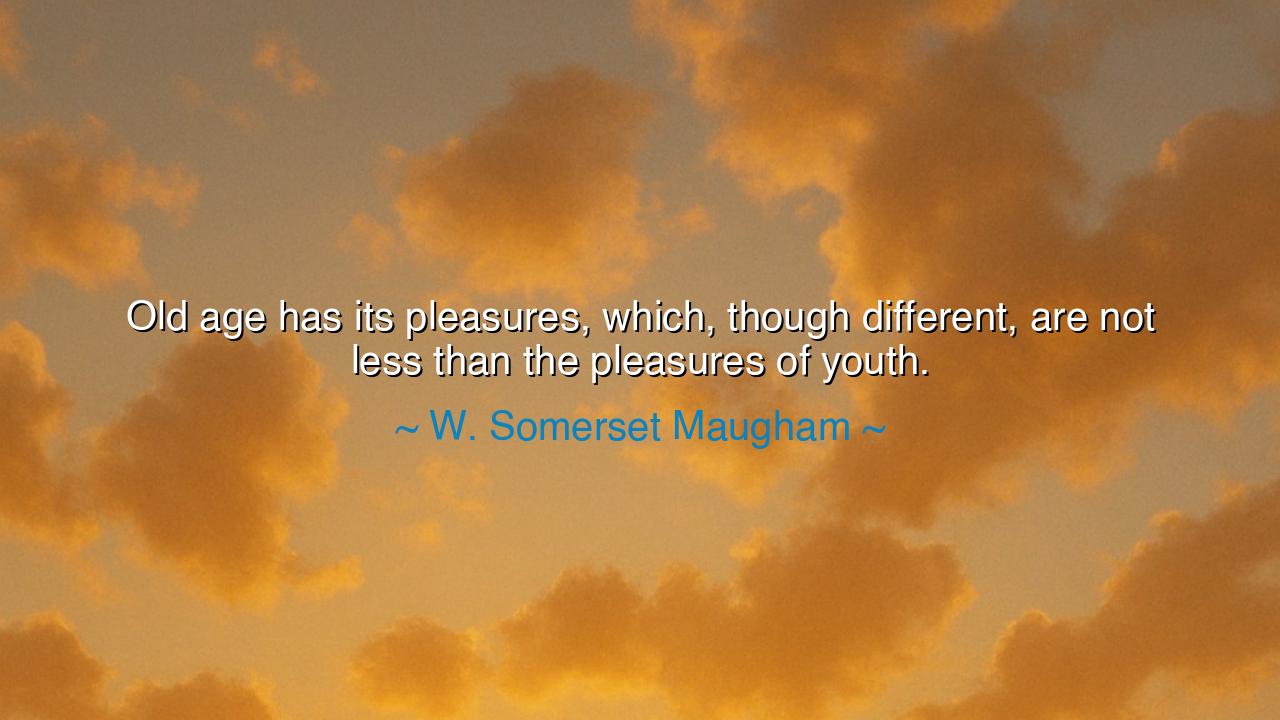
Old age has its pleasures, which, though different, are not less
Old age has its pleasures, which, though different, are not less than the pleasures of youth.






When W. Somerset Maugham, the master of storytelling and observer of the human soul, wrote, “Old age has its pleasures, which, though different, are not less than the pleasures of youth,” he was speaking not as a man resigned to the passing of years, but as one who had learned to see the deeper beauty hidden in the changing seasons of life. His words are a hymn to acceptance, to wisdom, and to the quiet radiance that replaces the fire of youth. Beneath their calm tone lies a profound revelation — that joy does not disappear with age; it transforms. The delights of youth are of the body and the senses, but the pleasures of age belong to the mind, the heart, and the spirit.
Maugham himself lived through the full arc of human experience — from the restless wanderings of youth to the contemplative solitude of his later years. Known for his sharp wit and piercing insight into human nature, he understood that time changes not the essence of joy, but its expression. The young seek pleasure in movement, in novelty, in the hunger of discovery. The old, having seen the world, find pleasure in reflection, in memory, in the stillness that reveals what once went unnoticed. Thus, to the wise, growing old is not a descent into loss, but an ascent into understanding. For where youth burns brightly, age glows steadily — and both are forms of light.
To say that the pleasures of old age are “not less” is to challenge the common illusion that youth holds a monopoly on happiness. Many lament aging as if it were a thief, yet Maugham reminds us that it is also a giver — of freedom, of perspective, of peace. In old age, the anxieties of ambition fade, the fever of comparison cools, and the heart learns to rest in gratitude. The thrill of speed becomes the joy of stillness; the hunger for more becomes the grace of enough. Such pleasures are quieter, yes, but deeper — like the calm of the sea after a storm.
History offers us many who have discovered this truth. Consider Michelangelo, who, well into his eighties, still worked with trembling hands upon marble, not to prove his genius but to commune with it. His art no longer sought glory but peace, and in that peace, he found fulfillment greater than fame. Or Leo Tolstoy, who in the twilight of his life turned from worldly success toward the inner life, finding in simplicity the serenity that eluded him in youth. Their later years were not marked by despair but by transformation — the flowering of wisdom that can only bloom after the tempests of youth have passed.
Maugham’s insight is thus not mere consolation, but a revelation of balance. The young chase intensity; the old cherish meaning. The young dream of the horizon; the old marvel at the garden. To despise aging is to reject half of life’s beauty. For youth gives us passion, but age gives us perspective. One teaches us how to begin, the other how to endure. The world, in its foolishness, glorifies only the spring, but the wise know that autumn too has its splendor — the gold of leaves, the clarity of air, the harvest of all that was sown.
Yet his words also carry a quiet warning: to taste the pleasures of age, one must first prepare for them. Those who live thoughtlessly in youth often find bitterness in old age, for they have not cultivated the inner life that sustains joy when strength departs. To grow old well is an art — it requires humility, gratitude, and curiosity. One must learn to love silence, to cherish companionship over conquest, to delight in small wonders. The pleasures of youth are given freely; the pleasures of age must be earned through patience and the wisdom of living deeply.
So, O seeker of wisdom, do not fear the coming of years. Let the body change, for the spirit does not grow old. Welcome the passing seasons as a poet welcomes dawn and dusk — each with its own colors, its own light. Find joy not only in what you can do, but in what you can see, what you can feel, what you can remember. Share your stories, nurture your compassion, and walk gently upon the earth, for every step is now a gift.
Thus, the teaching endures: age is not the end of delight, but its transfiguration. Youth gives us the fire to live; age gives us the light to understand life. In both, the soul finds its fullness. As Maugham reminds us, the pleasures of age are not less — they are simply wiser, quieter, and infinitely more profound. And when one learns to see them, even the sunset becomes as glorious as the dawn.






AAdministratorAdministrator
Welcome, honored guests. Please leave a comment, we will respond soon